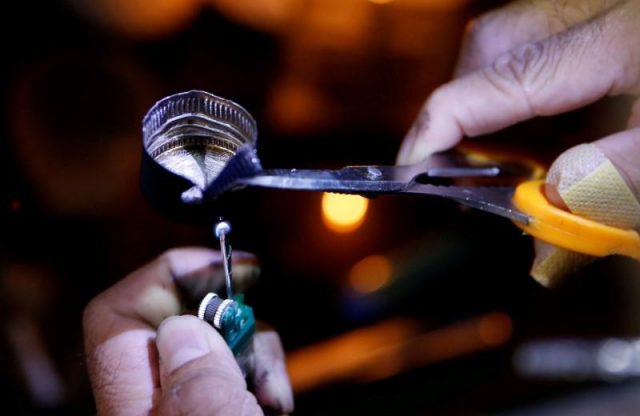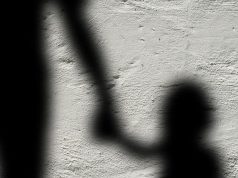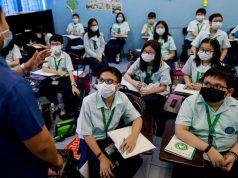
MANILA – Youth groups are opposing the Commission on Higher Education’s issuance of Memorandum Order 64 last week, which “strongly encourage[s]” higher education institutions to do mandatory drug testing as a requirement to admit and retain students, and will be implemented starting Academic Year 2018 to 2019.
In a press release on Wednesday, Kabataan Partylist Representative Sarah Elago said, “This will further legitimate Tokhang-style executions and arrests in schools, especially among the youth. CHED’s support on the ‘war on drugs’ will give license to militarization and police invasion in schools.”
She added, “Not so long ago, peasant leaders and civilians have been arrested and even killed under the ‘drugs’ bogey. Who is to say the same won’t happen to students?”
Drug tests would also be a financial burden for students, she said.
“If the government is serious in eradicating the drug epidemic, it should stop its crazy rampage on drug users, focus on rehabilitation, and actually address the roots of poverty and crime,” Elago added.
For its part, Samahan ng Progresibong Kabataan (SPARK) said mandatory drug tests for students and applicants would deny students of their right to accessible quality education, which CHED was supposed to promote. Drug tests also effedtively negate the inclusionary intent of President Rodrigo Duterte’s recently signed law making tuition free in state colleges and universities, said the group.
“Unless the CHED can guarantee that the excesses of state, police and school authorities are in check, then their mandatory drug tests shall place students’ lives and ambitions in peril,” SPARK said.
It continued: “We’re already witnessing the social costs of a state-sanctioned war on drugs at the national level. We can’t let that happen in our schools.”
School authorities must shun the CHED’s order, while students must fight mandatory drug tests during consultations, SPARK said.
CHED Memorandum Order 64 lays out the guidelines for HEIs which require drug testing of students. This is in accordance with the Higher Education Act of 1994 and the Comprehensive Dangerous Drugs Act of 2002, and in support of the administration’s war against drugs.
In the order, CHED Chairperson Patricia Licuanan says that schools must “adopt a strong policy on drug prevention” and use “all means necessary and reasonable” to ensure that the school environment is healthy and drug-free.
The order says local government units, the Philippine National Police, or any other law enforcement agency may conduct drug-related operations in school, “but only upon prior written approval and coordination” with the latter.
It also states that drug testing will be random, and that under the Dangerous Drugs Board Regulation No. 6, s. 2003 and No. 3, s. 2009, schools must ensure that drug testing is conducted “primarily for prevention and rehabilitation” and must “guarantee and respect the personal privacy and dignity of its students.”
The order stresses that drug test results will “be treated with utmost confidentiality” and will “not be used in criminal proceedings”.
But before a school can conduct a drug test, it “must be able to show that it has the approval of its Board of Trustees/Directors/Regents and has gone through the necessary student consultation process.”
Department of Health accreditation is a must for any drug facility, physician, or private medical practitioner which will conduct the drug test.
Applicants must be informed of the requirement of mandatory drug testing at the moment they apply. They will be responsible for the fee, and must only go to any DOH-accredited drug facility or the HEI’s DOH-accredited drug facility, if any.
“If found positive… the HEI shall not be precluded from admitting the student-applicant, subject to its rules and regulations,” the order says.
As for current students, the government will support the testing expenses, whether in public or private schools.
“In case the test result is positive, the Drug Testing Coordinator shall inform both the parent and the student concerned that a confirmatory test shall be conducted,” and talk to both about the process involved.
“If the confirmatory test yield[s] positive result, the same shall not be a basis for disciplinary action,” the order says.
Meanwhile, if the student is found to be drug-dependent, defined as “a person who regularly consumes or administers or allows others to administer to him dangerous drugs and has acquired a marked psychological and/or physical dependence on the drugs which has gone beyond a state of voluntary control,” then the appropriate sanction, intervention, and/or rehabilitation will be imposed on him or her, depending on school policy.
The order emphasizes that HEIs must guarantee the confidentiality of the results, and must not publish the results, whether positive or negative.
If a student refuses to undergo mandatory drug testing, the HEI must not presume that he or she uses or is dependent on drugs. But the student will be “subject to the relevant sanctions as provided in the Student Handbook.”
Should the CHED Legal and Legislative Services recommend it, the Commission en Banc may “impose the appropriate sanctions depending on the nature and seriousness of the violation or non-compliance of the HEIs and students.”









